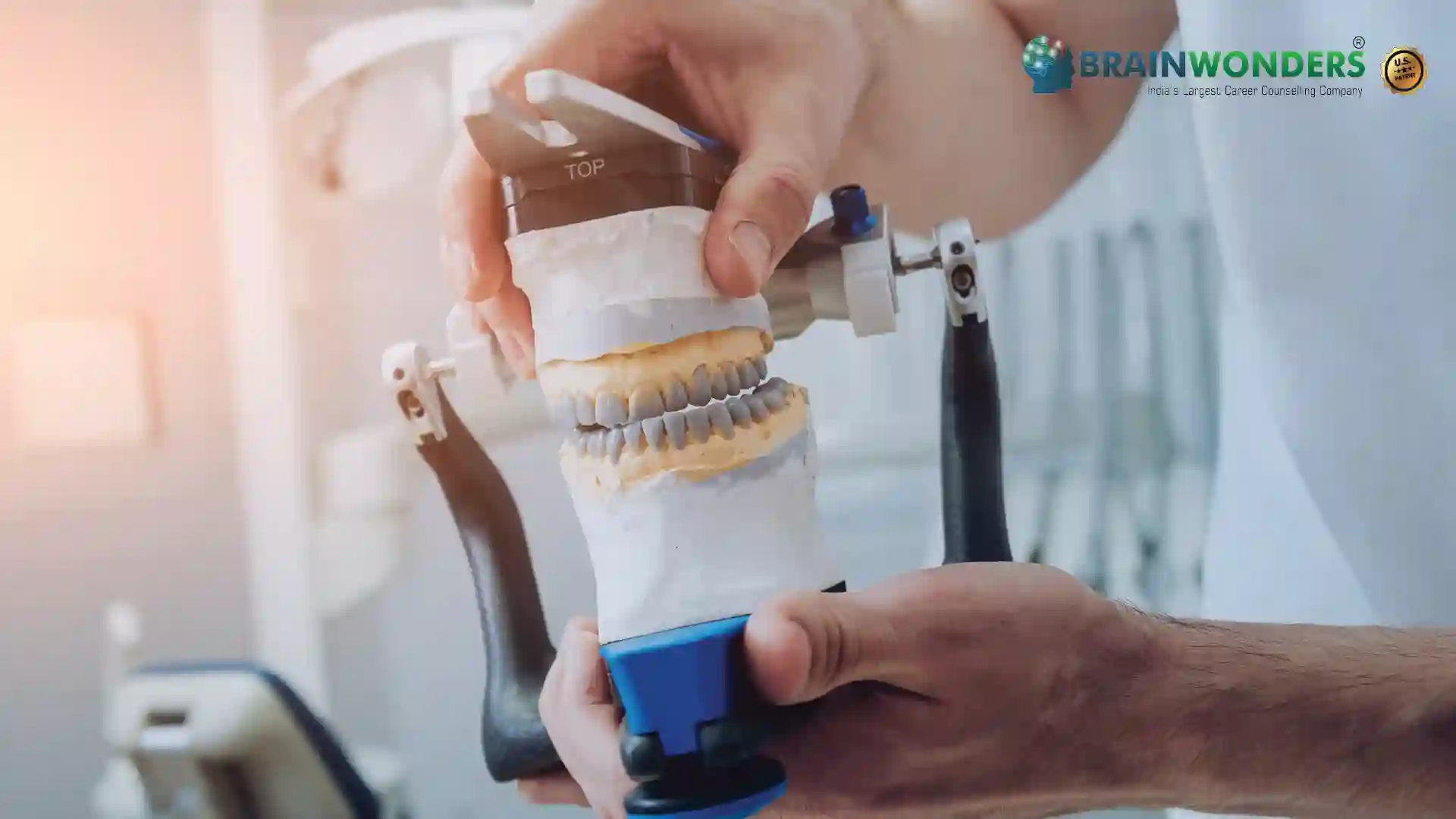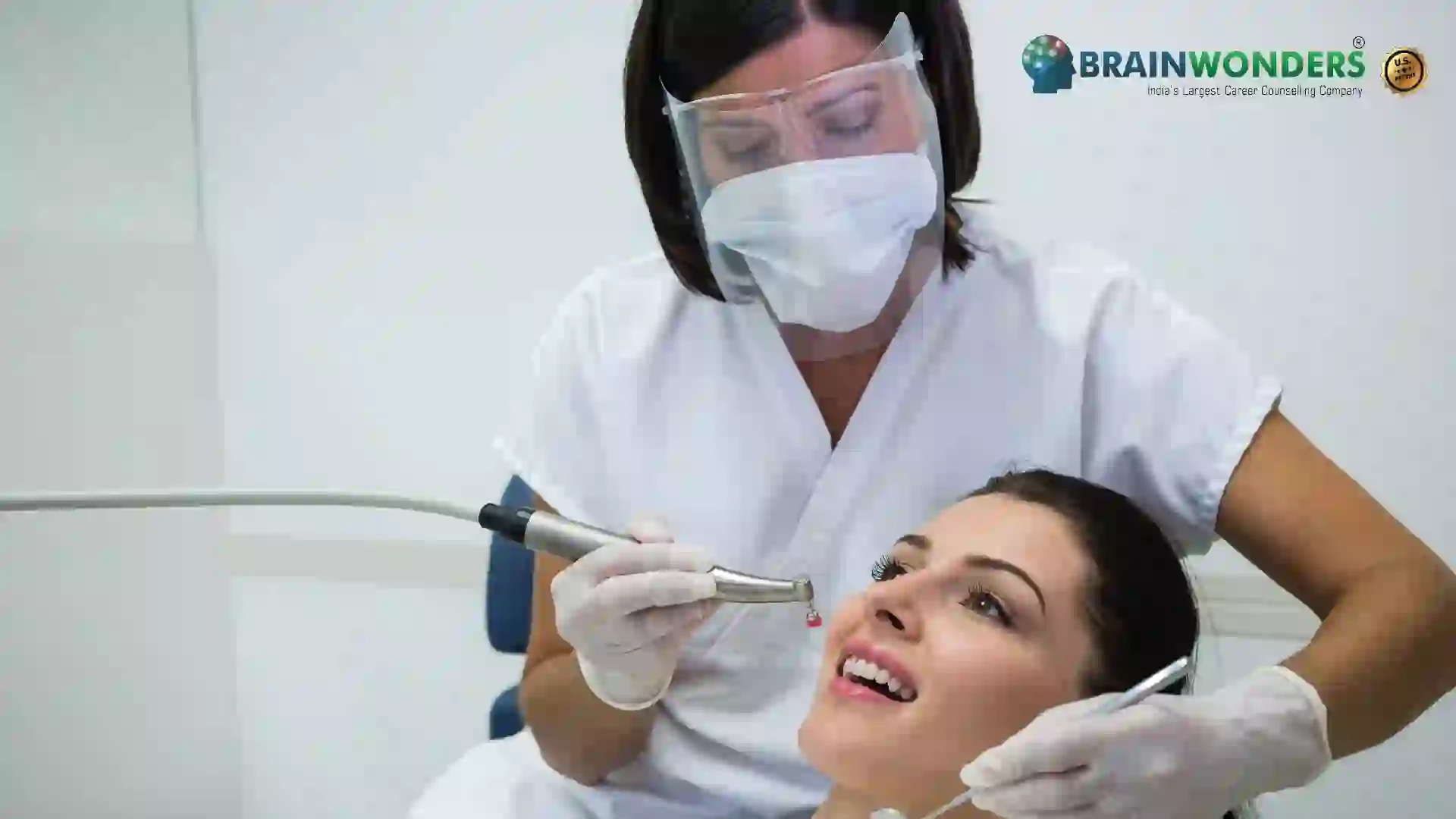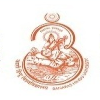Diploma in Dental Hygienist - Course, Fees, Eligibility, Top Colleges, Top Careers
Course Description
A Comprehensive Guide to the Diploma in Dental Hygienist Course
The Diploma in Dental Hygienist course is a two-year program to train candidates to become skilled oral health professionals. Their primary responsibilities include critical examination, diagnosis, and treatment of oral health issues such as teeth and gum diseases, mouth injuries, and other dental contingencies.
The annual fee for the Diploma in Dental Hygienist course varies from college to college. Government colleges generally offer lower fees than private institutions, resulting in an average fee range of INR 20,000 to INR 2 Lakhs.
Upon completing the course, candidates can explore various employment opportunities in government and private hospitals (dental wards), private dental clinics, community health centres, and NGOs.
Dental hygienists expect an average annual salary ranging from Rs 2.5 Lakhs to INR 8 Lakhs. However, this figure may increase based on their clinical experience, knowledge, and patient management skills.
After finishing the course, students can pursue additional certificate courses to enhance their skills or opt for a Bachelor's in Dental Surgery (BDS) degree. With a BDS degree, they can open private dental clinics and practice independently, offering a broader scope for career growth and success.
Advantages of Studying Diploma in Dental Hygienist
A diploma in Dental Hygienist offers numerous advantages, making it a highly rewarding career choice despite its challenges. Below are some of the reasons why candidates should consider pursuing this course:
- Lucrative Income and Respect: Opting for a career as a Dental Hygienist ensures a high income and earns respect in the field. As the healthcare sector is dynamic, job opportunities with better pay scales are readily available, and professionals can expect significant pay increments compared to other career options.
- The abundance of Career Opportunities: Candidates unlock many job opportunities upon completing the Diploma in Dental Hygienist course. They can choose from various positions, including those with attractive salary packages, and even have the option to establish their dental clinics. The scope for growth and success is substantial.
Diploma in Dental Hygienist Admission Process
The admission process for a Diploma in Dental Hygienist program typically involves the following steps:
- Eligibility Criteria: Check the eligibility criteria set by the institute offering the course. Usually, candidates must have completed their 10+2 education from a recognized board with a background in science subjects (biology, chemistry, and physics).
- Application Form: Obtain the application form from the respective institute online or offline. Fill in all the necessary details as required in the form.
- Submission of Documents: Submit the required documents along with the completed application form. These documents may include educational certificates, identity proof, passport-sized photographs, and any other documents specified by the institute.
- Entrance Examination (if applicable): Some institutes may conduct an entrance examination to shortlist candidates. The entrance exam may assess the candidate's knowledge in subjects related to science and aptitude for dental hygiene.
- Merit-based Selection: For institutes that don't conduct entrance exams, selection may be based on the candidate's academic performance in the qualifying examination (10+2) or previous educational degrees.
- Counselling/Interview (if applicable): Shortlisted candidates might be called for counselling or an interview to assess their interest and suitability for the course.
- Payment of Fees: Once selected, candidates must pay the course fees within the specified timeframe to secure admission.
Typical day at work
Frequently Asked Questions
1. What can I do after a diploma in dental hygiene?
Answer: After completing a diploma in dental hygiene, you can explore various career options in the dental healthcare industry. Some of the common career paths include:
a. Dental Hygienist: You can work as a dental hygienist in dental clinics, hospitals, or private practices. Your responsibilities may include teeth cleaning, oral examinations, taking X-rays, and educating patients about oral hygiene.
b. Dental Assistant: You can pursue a career as a dental assistant, supporting dentists during procedures, maintaining patient records, and preparing equipment for treatments.
c. Oral Health Educator: With additional certifications or degrees, you can work as an oral health educator, promoting good oral hygiene practices and conducting community dental health programs.
d. Dental Sales Representative: You can join the dental product industry as a sales representative, promoting dental products and equipment to dental clinics and professionals.
e. Pursue Higher Education: You can further your education by pursuing a bachelor's degree or higher in dental hygiene or related fields for better career prospects and specialization.
2. What is the salary for a diploma in dental hygiene in India?
Answer: The salary of a dental hygienist in India can vary depending on factors such as location, experience, and the type of employer. On average, a dental hygienist with a diploma can earn a starting salary ranging from INR 2.5 Lakhs to INR 4 Lakhs per annum. With experience and expertise, the salary can increase, and experienced dental hygienists may earn up to INR 6 Lakhs or more annually.
3. Can I do BDS after a diploma in dental hygiene?
Answer: Yes, in many cases, you can pursue a Bachelor of Dental Surgery (BDS) degree after completing a diploma in dental hygiene. However, admission policies may differ among universities and colleges. Some institutions may have specific requirements for diploma holders to gain entry into the BDS program. It is advisable to check with the individual dental schools or universities offering BDS to understand their specific admission criteria for diploma holders.
4. What degree is best for a Dental Hygienist?
Answer: For becoming a dental hygienist, the best degree option is a Diploma in Dental Hygienist. This diploma program equips you with the knowledge and practical skills required to work as a dental hygienist. It is a specialized course focused on oral health and dental care, preparing you for a dental clinic, hospital, or private practice career. However, you may pursue a Bachelor of Dental Hygiene or related degrees in dental sciences to advance your career or specialize further.
5. What is the cost of the Dental Hygienist course in India?
Answer: The cost of the Dental Hygienist course in India can vary based on the institute and the course duration. On average, the total fees for a Diploma in Dental Hygienist course in India can range from INR 50,000 to INR 2 Lakhs. Government colleges or institutions may offer the course at a lower fee than private dental schools. Researching different institutes is essential to find the one that best fits your budget and offers quality education.
Eligibilty
Diploma in Dental Hygienist: Eligibility Criteria
The eligibility criteria for a Diploma in Dental Hygienist program may vary depending on the institute or college offering the course. However, the general eligibility requirements are as follows:
- Educational Qualification: Candidates should have completed their 10+2 education from a recognized board or equivalent. The educational background should typically include science subjects such as biology, chemistry, and physics.
- Minimum Marks: Some institutes may have specific minimum marks criteria in the 10+2 examination that candidates must meet to be eligible for the course.
- Age Limit: There might be an age limit for admission to the course. The age criteria, if any, can vary from one institute to another.
- Language Proficiency: As the course may involve communication with patients and medical professionals, candidates may need to demonstrate proficiency in the language of instruction, which is often English.
Colleges




